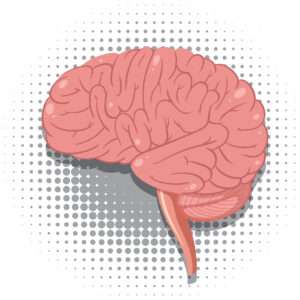Brain Tumor Surgery in India
According to the parameters below, the average brain tumor treatment cost in India might range from about INR 1 lakh to several lakhs.
For instance, the brain tumor surgery cost in India might range from INR 1 to 5 lakhs, while the cost of radiation therapy can be anywhere between INR 2 and 6 lakhs. The medications used, and the length of the course of treatment can both affect how much chemotherapy costs.
Please contact eminent cancer specialist Dr. Sridhar PS for an expert evaluation of the patient’s condition to work out a reliable and cost-effective treatment plan.
The brain tumor treatment cost in India can differ based on many variables, including:
- The type of tumor
- The location of the tumor
- The stage of the tumor
- The treatment strategy employed
- The hospital or healthcare facility of treatment
- The location of the hospital
- The cancer specialist’s knowledge and experience

The success rate of brain tumor treatment
The success rate of treatment for benign tumors are often high, with a cure rate of 90% to 100% for complete resection. Complete resection refers to removing the entire tumor, leaving no trace of cancer behind.
Glioblastoma multiforme, the most prevalent malignant brain tumor, has a 5%–10% 5-year survival rate for individuals receiving radiation therapy and chemotherapy. The survival rate can be significantly greater for lower-grade gliomas, with some managing the condition for many years. The cost of chemotherapy for brain tumors can be a significant factor for patients, impacting their overall treatment journey and financial well-being.
Brain Tumor Surgery in India
Tumors in the brain or its surrounding tissues are caused by abnormal and uncontrolled cell growth. These tumors can be either malignant (cancerous) or benign (non-cancerous). The World Health Organization (WHO) estimates that there are around 296,851 new cases of brain tumors per year in the world. It is crucial to remember that brain tumors can be challenging to diagnose and might not be reported to the appropriate authorities in some nations.
In India, where healthcare services are advancing rapidly, the cost of brain tumor surgery is relatively more affordable compared to many other countries, making it a viable option for patients seeking quality treatment.
A brain tumor diagnosis can cause intense emotions and stress for patients and their loved ones. It can be overwhelming and leave people feeling terrified, uncertain, and apprehensive about their future.
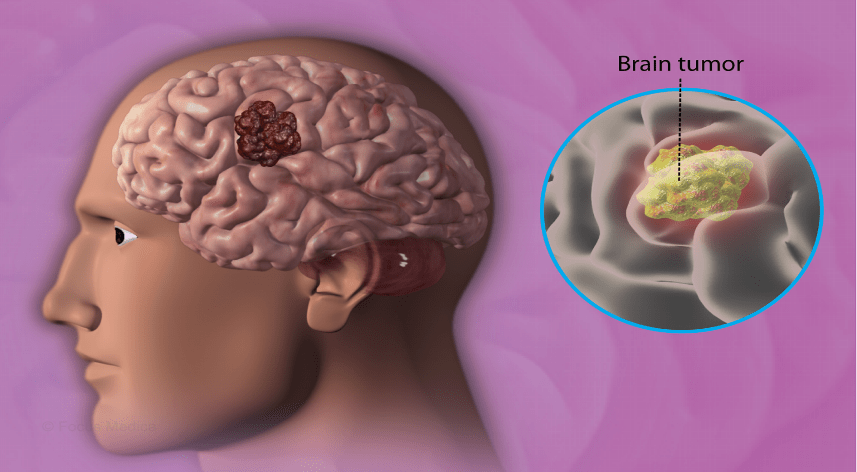
“Patients and their loved ones experience a range of emotions including shock, denial, anger, sadness, and depression,” says Dr. Sridhar P S, a renowned cancer specialist for CyberKnife Treatment in India. “Fortunately, significant improvements in brain tumor treatment have been made in recent years, including the creation of novel brain surgery methods, radiation therapy, and chemotherapy.”
Understanding the emotional challenges is crucial, and Dr. Sridhar PS emphasizes the importance of addressing concerns, including the cost of brain surgery, to ensure comprehensive support for patients and their families.
Patients can receive the best brain tumor treatment in India with numerous highly advanced hospitals, skilled medical professionals, and cutting-edge healthcare facilities.
Additionally, Dr. Sridhar offers competitive brain tumor surgery costs, ensuring accessible and quality care for patients seeking advanced treatment options. The combination of state-of-the-art medical expertise and affordable surgical options makes India a preferred destination for individuals seeking comprehensive brain tumor care.
Explore affordable options for your brain tumor treatment cost – prioritize your health without compromising your finances
Brain Tumor - Treatment options
Some brain tumor treatment options include:

1. ART (Adaptive radiation therapy)
ART uses sophisticated software to continuously monitor and adjust the radiation dose supplied to a patient’s tumor throughout treatment. This technique allows for more precise radiation treatment of cancer while minimizing radiation exposure to healthy tissues.

2. Radiation therapy
High-energy radiation is used in radiation treatment to eliminate cancer cells. The surgeon may use this treatment before or after surgery or as a standalone treatment for tumors that surgery cannot remove.

3. Targeted therapy
Medications that specifically attack certain chemicals in cancer cells are used in targeted therapy to stop the growth and spread of cancer cells.

4. Chemotherapy
Chemotherapy is a process in which medications are administered orally or through IV to destroy cancer cells. As with radiation therapy, it can be used with surgery or independently in cases where surgery is not an option.

5. Surgery
Removing as much cancer as feasible is essential to preserve brain function. Surgery is frequently the first course of action for treating brain tumors. The surgeon may employ traditional open surgery like Craniotomy or minimally invasive methods like Neuroendoscopy.

6. Immunotherapy
Immunotherapy enlists the immune system’s help in battling cancer cells. It is a more recent alternative for treating brain tumors. Researchers are continually focusing on several key areas to advance the potential of immunotherapy.
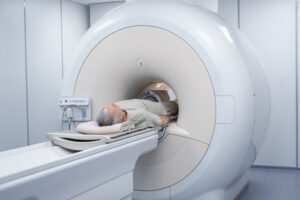
7. Stereotactic radiosurgery
Stereotactic radiosurgery is a non-invasive procedure that targets a particular brain region using several radiation beams. It is beneficial in treating small tumors or tumors that surgery cannot remove. Examples of Stereotactic radiosurgery include CyberKnife, Gammaknife, Tomotherapy, etc.
If you are considering getting cancer treatment in India, please do not hesitate to consult Dr. Sridhar P S. He is highly respected for his expertise in various cancer treatments, including CyberKnife treatment for brain cancer.
Key Benefits of Choosing Brain Tumor Surgery in India
- Highly skilled surgeons
- Advanced medical infrastructure
- Cost-effectiveness
- Shorter waiting times
- Medical tourism support
- Holistic care
Book An Appointment
Types of Brain Tumors
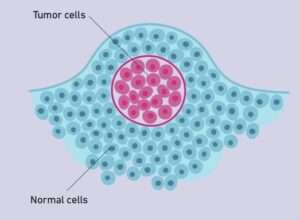
Benign Brain Tumors
It is slow-growing, non-cancerous growths. They do not spread to other areas of the body. The need for treatment depends on their location, size, and symptoms. Though non-cancerous, if benign brain tumors are too big or push on the brain’s vital organs, they can produce severe symptoms and problems.

Malignant Brain Tumors
It is also known as brain cancer, are a cancerous development that has the potential to grow fast and aggressively infiltrate other organs. They can spread through the circulation or lymphatic system to different sections of the body and regions of the brain or spinal cord. Malignant brain tumors are more likely to recur and have more severe symptoms and effects.
Unlock Hope, Defeat Brain Tumors
Book an Appointment Now
Symptoms of Brain Tumor
The signs and symptoms of a brain tumor might change based on the tumor’s kind, size, location, and growth pace. The following are some typical signs of brain tumors:
- Headaches: Severe or persistent headaches that do not improve with over-the-counter pain relievers.
- Seizures: Partial or full-body seizures that occur suddenly and without warning.
- Vision or hearing problems: Blurred or double vision, loss of peripheral vision, or hearing loss are all examples of vision or hearing issues.
- Cognitive alterations: Changes in personality or behaviour , memory loss, difficulty concentrating, or confusion.
- Numbness or weakness: Numbness or weakness in the arms or legs or issues with coordination and balance.
- Nausea and vomiting: Nausea and vomiting, particularly if they happen in the morning or due to a position change.
- Speech changes: Difficulty speaking or word slurring.
- Fatigue: Tiredness and lack of energy even after obtaining proper rest.
Note: Various illnesses can also cause these symptoms, so these symptoms do not always indicate a brain tumor.
“Nonetheless, it is crucial to speak with a healthcare professional for an appropriate diagnosis and course of treatment,” advises highly-qualified radiation specialist Dr. Sridhar P S. “Early detection and treatment of brain tumors can enhance the patients’ prognosis and quality of life.”
Dr. Sridhar P S is one of the most sought-after radiation oncologists for brain cancer treatment in India.
Causes of Brain Tumor
- Genetics : Inherited genetic mutations may cause some types of brain cancers.
- Age : The chances of developing a brain tumor increase with age, and older adults show the highest incidence of brain tumors.
- Radiation Exposure : Exposure to ionizing radiation, such as radiation therapy for other cancer or disorders, can increase the chances of developing a brain tumor.
- Head Injuries : People with a previous head or brain injury may be at increased risk of developing a brain tumor.
- Immune System Disorders : Certain immune system disorders, such as HIV/AIDS, may increase the risk of developing a brain tumor.
- Chemical Exposure : Certain chemicals, such as pesticides and industrial solvents, can increase the risk of brain tumors.
- Lifestyle Factors : Studies suggest that excessive smoking and alcohol consumption may increase the chances of developing brain tumors.
Take action today to raise awareness for a cure – together, we can conquer brain tumors
Managing brain tumor
In addition to the treatments mentioned above, supportive care may be suggested to help patients manage their symptoms and enhance their quality of life, such as:
• physical therapy
• occupational therapy
• speech therapy
Why Choose Dr. Sridhar PS?
Dr. Sridhar PS has extensive knowledge and experience in radio oncology, having undergone specialized training and education to develop expertise in this complex area. He is adept at utilizing advanced surgical techniques, instruments, and technology to safely and effectively remove tumors while minimizing damage to surrounding healthy brain tissue.
Dr. Sridhar PS is very patient-centric, listens attentively to his patients, and explains the treatment options clearly and clearly. He collaborates closely with other specialists, such as oncologists, radiologists, pathologists, and rehabilitation experts, to develop comprehensive treatment plans tailored to each patient’s needs.
Dr. Sridhar PS is a dedicated brain tumor surgeon who stays updated with the latest advancements and research. He actively participates in conferences, seminars, and research activities to enhance his knowledge and improve patient outcomes through evidence-based practices.
With over 19 years of expertise, Dr. Sridhar PS is among the leading oncologists for brain cancer treatment in India.
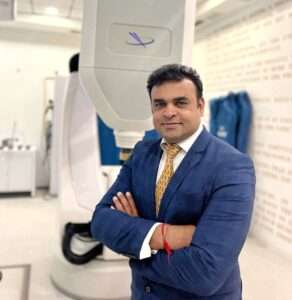
Frequently Asked Questions
The tumor’s nature and stage determine whether it can be cured. If the entire tumor is removed during surgery, benign tumors, which are not cancerous, can be cured entirely. The chances of a full recovery from carcinogenic malignant tumors are lower. However, treatment can help keep cancer under control and enhance the quality of life.
The likelihood of surviving for 20 years while battling a brain tumor relies on several variables, including the tumor’s form and stage, the patient’s age and general health, and the chosen treatment strategy. For instance, some patients with low-grade gliomas may have a long life expectancy, whereas others may have a shorter one.
The most advanced stage of brain tumors, stage 4, is often the most challenging to treat. Treatment, however, can assist in reducing the tumor’s size and enhance the quality of life. Surgery, radiation therapy, chemotherapy, targeted therapy, and clinical trials are the primary forms of treatment for Stage 4 brain tumors.
Genome sequencing of brain tumors involves analyzing the DNA content of the tumor cells to identify genetic abnormalities, enabling a personalized understanding of the tumor’s characteristics and potential treatment options.


